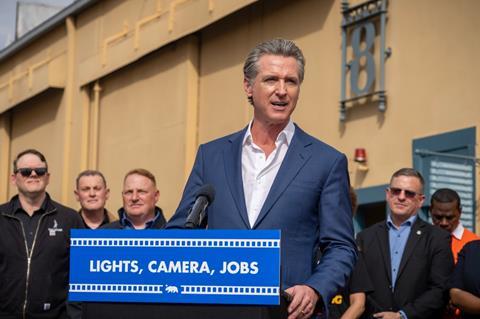
California Governor Gavin Newsom has proposed to double the film and TV tax incentive to $750m in what would see the state offer the highest capped programme in the United States, and the second highest of all behind uncapped Georgia.
Amid a post-strike production decline and concern that California is at risk of falling well behind other states – let alone countries – that offer highly competitive incentives, Newsom has endorsed a huge increase from the current $330m allocation.
If approved by state legislators next year the measure would come into effect with California’s Film & Television Tax Credit Program 4.0 on July 1, 2025. The tax credits will become refundable for the first time since the programme was established in 2009.
Newsom, who unveiled the proposal at Raleigh Studios in Los Angeles on Sunday, said: “California is the entertainment capital of the world, rooted in decades of creativity, innovation, and unparalleled talent. Expanding this program will help keep production here at home, generate thousands of good-paying jobs, and strengthen the vital link between our communities and the state’s iconic film and TV industry.”
The Governor’s office said that California’s incentive has been oversubscribed for a number of years, adding that between 2020 and 2024 the state lost production spending due to limited tax credit funding and increased competition in other jurisdictions. An estimated 71% of rejected projects subsequently filmed out-of-state.
Latest data from FilmLA showed that summer production in the Greater Los Angeles fell 5% year-on-year as the third quarter delivered 5,048 shoot days in the weakest quarter of 2024 so far.
Last week SAG-AFTRA’s national executive director and chief negotiator Duncan Crabtree-Ireland responded to remarks by outgoing Sony Pictures Entertainment CEO Tony Vinciquerra, who told Mipcom that the length of the actors’ and writers’ strikes as well as their renewed contract terms have forced productions out of the US.
“Threatening the offshoring of American jobs is a cynical attempt to manipulate workers while masking the industry’s own business failures,” said Crabtree-Ireland. ”It is a false narrative that American workers have to choose between fair wages and contracts and losing their jobs. Our members won’t be fooled.”






![The Brightest SunScreen[Courtesy HKIFF]](https://d1nslcd7m2225b.cloudfront.net/Pictures/274x183/3/5/0/1448350_thebrightestsunscreencourtesyhkiff_312678.jpg)


















No comments yet